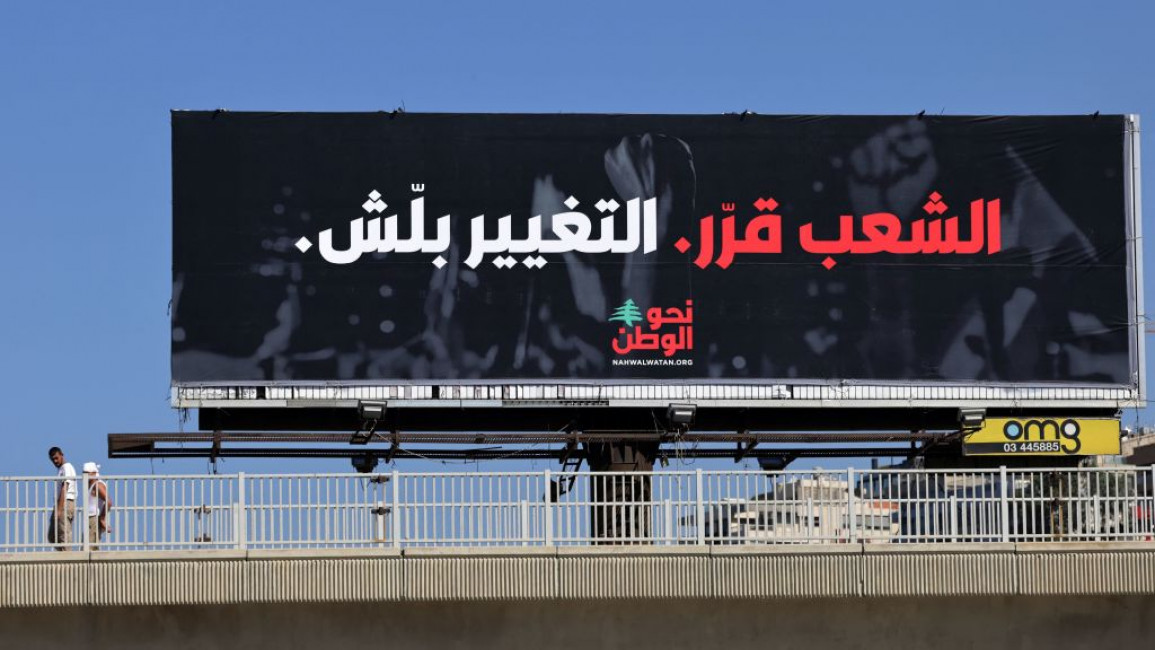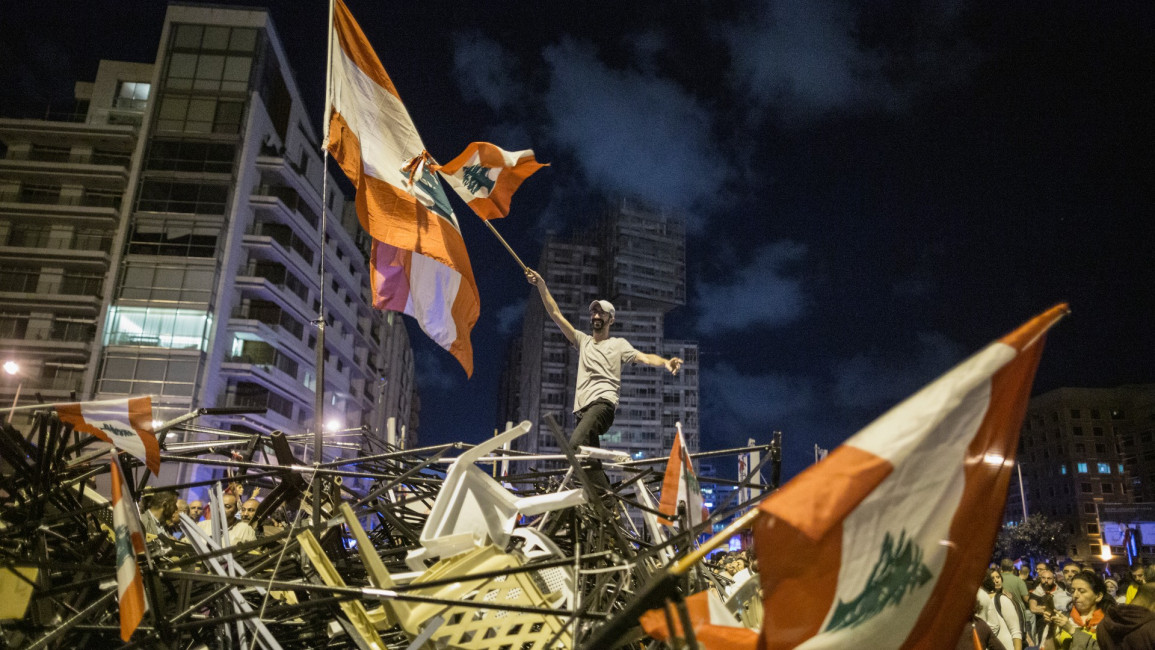
One year since elections, have Lebanon's new opposition MPs made a difference?

The results of the 2022 Lebanese general elections highlighted two significant changes within the country's political landscape.
Firstly, Hezbollah and its allies lost their majority in terms of seats in the parliament and, secondly, 13 independent MPs belonging to the opposition movement were voted in.
Lebanon’s revolution, or thawra, began in 2019 after mass protests by civil society groups called to dismantle the corrupt, sectarian ruling class and demanded social and economic rights and accountability for the economic turmoil created by financial misconduct.
Since then, activists from the 17 October movement have made attempts to gain access to political entities and institutions controlled by traditional sectarian parties. These efforts involved participating in, and winning, various syndicate elections over the last few years.
"The 15 May vote marked a significant milestone for the opposition movement by allowing 13 non-sectarian independent MPs to enter the Lebanese parliament for the first time"
As political analysts often use syndicate elections as a benchmark for general elections, there were high expectations for candidates from the thawra movement in the 2022 general elections.
The 15 May vote marked a significant milestone for the movement by allowing 13 non-sectarian independent MPs to enter the Lebanese parliament for the first time.
These elected MPs came from diverse backgrounds, yet they shared a common goal of changing the system that had plunged the country into an economic meltdown and political instability.
One year has passed since then, and the 13 independent MPs (who later renamed themselves Forces of Change) are still trying to spotlight the misconduct of the ruling class and change the political system from within.
But what has been their impact on the Lebanese political system?
According to Christiana Parreira, an assistant professor in the Department of International Relations and Political Science at the Graduate Institute, the rise of non-sectarian candidates representing civil society has broken the monopoly of Lebanon's traditional sectarian parties for the first time since the end of the civil war.
"The idea that there is an elite cartel that has a monopoly over electoral politics, the idea of the infallibility of these elites have been broken, and the idea that these people can't be beaten is maybe gone, and I think that the election of this new movement will have ramifications for future electoral cycles regardless how it performs in office," she told The New Arab.
In the general elections held in 2018, the only elected independent candidate was the Lebanese journalist Paula Yacoubian, who resigned in 2020 following the Beirut port explosion, only to be re-elected in 2022.
While the election of 13 new MPs last year surprised a portion of the political establishment, the results fell short of expectations for some voters who had expected more independent candidates to be elected.
|
|
However, those who expected a better electoral result didn't take into consideration that the momentum of the mass protests had gradually waned over time, and opposition candidates couldn't leverage and sustain enough of the enthusiasm witnessed during initial protests during the election campaign.
Furthermore, the candidates from the 17 October movement were unable to unify under a single banner, and the presence of fragmented opposition groups hindered their ability to secure the expected number of seats.
After entering parliament, the Forces of Change MPs showed their initial limits. Despite being veteran activists, they had little experience and knowledge of political dynamics.
For Michael Young, a political analyst and senior editor at the Carnegie Middle East Center, the Forces of Change MPs couldn't unite themselves by establishing a political party as each had their own preferences and ambitions and came from different political election lists.
"The idea that there is an elite cartel that has a monopoly over electoral politics, the idea of the infallibility of these elites have been broken, and the idea that these people can't be beaten is maybe gone"
"It would have been challenging to put them into an organisation with a certain hierarchy where they would have had to adopt internal discipline on certain issues because that's not where they came from," he told The New Arab.
The lack of organisation, coordination, and political differences among the MPs became evident during their initial experience in parliament. This was observed during the election of the parliament speaker, where Nabih Berri was re-elected for the seventh time, as well as in the selection of the parliament's deputy speaker and the consultation for appointing the government's prime minister.
They faced challenges in taking the initiative or reaching a consensus on a common candidate.
Parreira explained that the lack of coordination is common among opposition movements in general, and is not just limited to Lebanon. However, she also emphasised the internal differences within the group regarding political tactics.
"When you look at the positions of the Forces of Change's MPs, they're quite diverse," she said, encompassing who should bear the burden of economic losses, stances towards religious elites, positions on Hezbollah's weapons, and the level of cooperation with traditional or sovereigntist opposition parties.
Such differences became evident in the unsuccessful attempts at coordination among MPs, she added.
Young explained that although their achievements in terms of political results have been relatively limited, the new MPs have been active in terms of parliamentary debate and their presence in the parliament has spotlighted traditional parties' political misconduct.
The political and ideological differences within the new group of MPs peaked in October 2022 when Michel Douaihy left the group, shedding light again on the internal divisions within the bloc.
These differences were further reinforced during the election of Lebanon's President as Michel Aoun ended his mandate in October 2023.
Since then, the parliament has been unable to elect a president due to the lack of agreement among traditional parties. But during this period, the Forces of Change have not played a proactive role in the political debate, and their votes have been scattered among different blocs.
|
|
Some of the presidential candidates proposed by the Forces of Change did not receive enough support. Meanwhile, several MPs staged a round-the-clock sit-in inside the parliament, urging all representatives to elect a president and refrain from holding legislative sessions to approve laws.
Young told The New Arab that the Forces of Change's MPs haven't taken a strong position in the presidential elections.
"Although the Forces of Change's MPs wanted to support certain candidates, these avoided being publicly supported because their candidacy could have been prematurely killed," he said.
But despite little impact within the parliament, the Forces of Change seem not to have lost a direct line with their voters and civil society groups.
They have attended numerous demonstrations since they were elected, standing in solidarity with citizens who have been locked out of their bank accounts and relatives of the victims of the Beirut blast, together with other protest groups across the country.
"I think that the election of this new movement will have ramifications for future electoral cycles regardless how it performs in office"
However, some of the new MPs have also faced criticism for certain missteps and ambiguous positions. Most of all, they are facing a dilemma in which, on the one hand, dealing with traditional political parties on specific issues has given them a voice in the political arena.
On the other hand, this may potentially disappoint a portion of their more radical supporters who continue to advocate for acting against the political establishment without any distinctions.
"They have to find a balance as voters and civil society leaders all have different ideas as to what that ideal balance looks like because traditional opposition parties are all trying to leverage this idea of opposition for their own electoral benefit," Parreira said.
Young also argues that dealing with traditional political parties poses a dilemma for the Forces of Change's MPs.
"While it is considered positive for the Forces of Change's MPs to uphold principles that differentiate them from traditional parties, they still have to engage in conversations with them,” he said.
“However, they must also be mindful that the longer they stay within a political institution, the more likely they are to adopt its habits, potentially putting them at risk of looking like other political forces, even though they are not aligned with any particular party's agenda."
It is crucial for new MPs to coordinate their approach and agree on fundamental principles to establish a clear political agenda and avoid disappointing their constituents.
In some ways they have already started operating in this way, by, for example, requesting the resignation of Lebanon's Central Bank Governor Riad Salameh, who is currently being investigated in Lebanon and six European countries for alleged financial misconduct.
But their transition from activists to politicians with a proactive role is still far from being accomplished.
|
|
"The 17 October protests were modelled on the idea that they would not be like the traditional parties that are extremely hierarchical. The Forces of Change's MPs were elected on a very different basis than the established traditional parties, which are massive patronage machines. Instead, these MPs were elected based on the promise of a better future," she said.
Forming around 10 percent of the parliament, the new MPs don’t represent a threat to the ruling class at the moment.
But although they have had little impact one year on from their election, they have acted as a picklock to unhinge the political monopoly of the legislative branch.
This achievement could serve as a bridgehead for more candidates in the next general elections to enter parliament and widen the non-sectarian opposition bloc, as long as they continue to keep a direct line with their voters and extend their electoral constituency by showing they can make a difference inside parliament.
Dario Sabaghi is a freelance journalist interested in human rights.
Follow him on Twitter: @DarioSabaghi




![President Pezeshkian has denounced Israel's attacks on Lebanon [Getty]](/sites/default/files/styles/image_684x385/public/2173482924.jpeg?h=a5f2f23a&itok=q3evVtko)



 Follow the Middle East's top stories in English at The New Arab on Google News
Follow the Middle East's top stories in English at The New Arab on Google News


